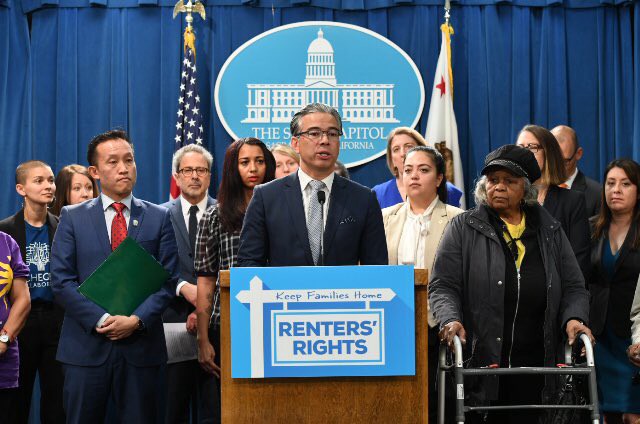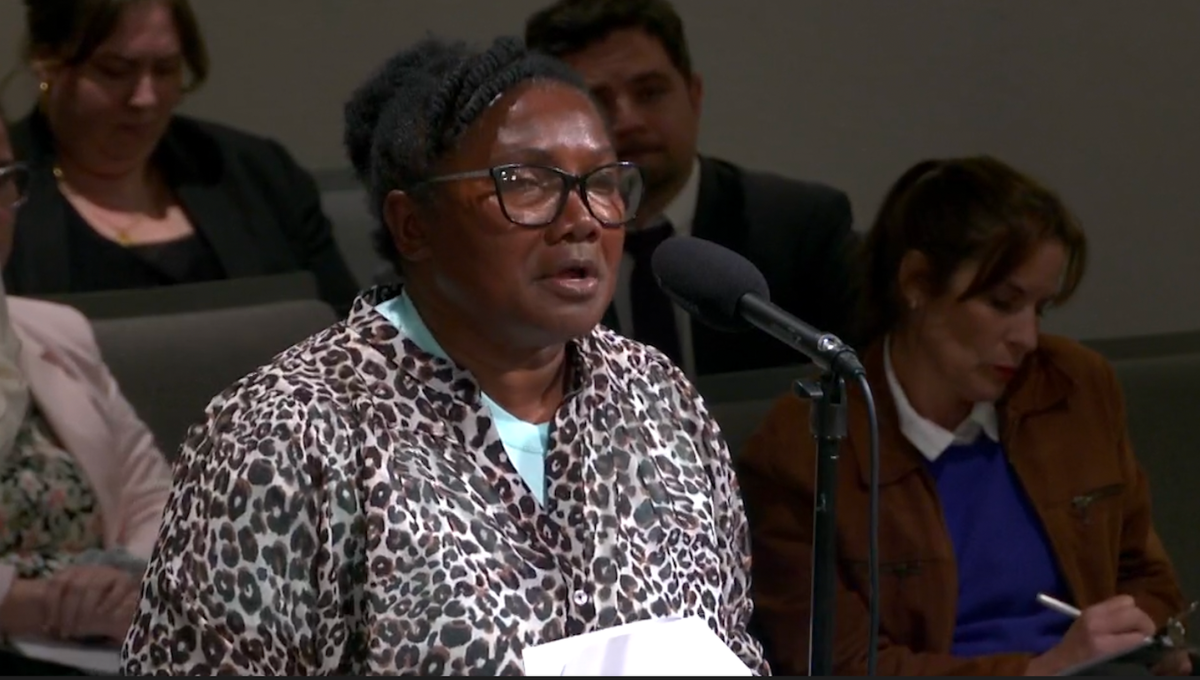What You Need to Know About the CA Renters’ Rights Bills

In last November’s election, tenant advocates advanced a campaign that would have repealed the Costa Hawkins Rental Housing Act — the state law that places severe restrictions on local rent control ordinances. While Prop 10 ultimately failed at the ballot, the initiative successfully drove a conversation about the plight of tenants to the center of our political stage.
After the election, Governor Newsom acknowledged that “the pressures on vulnerable renters didn’t go away after the election.” He called on legislators to protect tenants, saying “this is my promise to you — you bring me a good package on rent stability and I will sign it.”
We’re excited to announce, alongside ACCE, the Western Center on Law and Poverty, PICO California and Public Advocates, that we’re going to hold Governor Newsom to that promise. We are co-sponsoring four bills in this year’s legislative session that collectively work to stabilize housing for renters across the state.
Though we’ve been working on tenant protection issues as part of our larger focus on housing for the past two years, this represents the first time TechEquity will be sponsoring statewide legislation. We believe whole-heartedly that each of these bills will have a significant positive impact on the lives of California renters.
Read on to learn more about these bills, and sign up here to help us get them passed.
TL;DR:
AB 36, authored by Assemblymember Bloom, will reform Costa-Hawkins to loosen restrictions on local rent control ordinances, allowing cities to expand rent control coverage if they so choose.
AB 1482, authored by Assemblymember Chiu, will cap the amount by which landlords can increase rent year over year, giving more stability to all renters in California.
AB 1481, authored by Assemblymember Bonta, will help protect all Californians from baseless and unjust evictions.
AB 724, authored by Assemblymember Wicks, will establish a rental registry so the state can get better data on where and how rent increases are happening.
AB 36 — Costa-Hawkins Reform
In 1995 the California Legislature passed the Costa-Hawkins Act, which limits the ability of local governments to enact certain types of rent control. The law makes it impossible for city-level rent control ordinances to apply to buildings built after 1995 and to all single-family homes, regardless of when they were built.
AB 36, authored by Asm. Bloom, would reform some key elements of Costa-Hawkins, such as moving the arbitrary 1995 cut-off date from a fixed year to a moving window (i.e. properties newer than 10 years old). It would also lift the ban on single-family homes, which make up a significant portion of the state’s housing stock. In San Francisco, 32% of the city’s housing stock is single-family homes. The bill also exempts small-scale landlords that own one or two properties.
These changes would enable cities to enact rent control on many more rental properties, giving stability to thousands of California renters.
Last year we took a neutral position on Prop 10, which sought to repeal Costa-Hawkins in its entirety. You can read more about the thinking behind our position here. Reforming Costa-Hawkins instead of repealing it addresses many of the concerns we laid out in our position statement.
AB 1482 — Anti-Rent Gouging
While reforming Costa-Hawkins could provide expanded rent control protections for cities that opt to do so, Costa-Hawkins reform alone wouldn’t provide stability for every California renter.
It’s important to be very clear about what Costa-Hawkins reform under AB 36 would and would not do. It would not impose rent control across California. It would simply remove a barrier for local governments to set up broader rent control regimes of their own, if they choose to do so.
But the vast majority of cities won’t. Only fifteen California cities currently have a rent control ordinance on the books; after a wave of cities passed rent control in the late 70s and early 80s, it took 33 years for the next ordinance to pass in Richmond in 2016. This leaves more than 75% of California renters without any realistic hope of protection.
We need to provide stability to all renters in our state, immediately. AB 1482 will protect renters from exorbitant and unpredictable rent increases by capping the amount that landlords are allowed to increase rent year over year.
This concept of “anti-gouging” already exists in state law. It is currently illegal to increase prices on goods, including housing, by more than 10% in the wake of a natural disaster. The law was invoked in the aftermath of the North Bay fires in 2017. Asm. Chiu, author of the bill, stressed at the Renters’ Rights press conference, “our housing crisis is already a statewide emergency.” AB 1482 would expand that coverage to all rental housing in the state.
While the exact percentage cap has yet to be determined, it will be set at some level comfortably above the cost of living. Which will allow landlords to make a healthy return and, at the same time, give some certainty to renters about the potential range of their annual rent increase.
Without anti-gouging or rent control, landlords can — and have — raised the rent arbitrarily to any percentage they deem appropriate. Renters in California have seen their rent increase anywhere from a few percent to more than double their existing rate.
Especially for low-income families living paycheck to paycheck, the lack of predictability under our current “anything-goes” regime gives them no way to plan or budget for the future. AB 1482 would help create that stability.
AB 1481 — Just Cause for Eviction
In the majority of cities across California, landlords are not required to give any stated reason for eviction. Tenants can be uprooted from their homes with little notice and no good reason.
AB 1481 would prevent tenants from arbitrary and unfair evictions practices by requiring landlords to give a “just cause” for eviction. A handful of cities throughout California have existing “just cause” ordinances that require landlords to show a specific and valid reason—such as failure to pay rent or serious lease violations—in order to evict a tenant, but no protections exist in the majority of California cities.
The bill also sets forth a process for eviction proceedings, requiring landlords to serve their tenants with notice. We supported a similar bill last year, also authored by Asm. Bonta, that unfortunately died in committee. We’re excited to see this important protection for renters return to the legislature this year.
AB 724 — Rental Registry
We know that the situation for California renters is dire, but without comprehensive data it’s hard for policymakers to understand who is most vulnerable and which policy interventions will be most effective.
Some cities currently collect information about how many evictions are taking place or how much rent is increasing, but most cities don’t collect anything at all. Asm. Wicks is introducing a Rental Registry “in order to achieve evidence-based policies that fight displacement and protect tenants.”
She believes “we need a more complete picture of the reality renters face. AB 724 gets us thereby creating a statewide rental registry to track key stats on rental housing and evictions.”
Renters’ Rights are Key to the Housing Fight
While we work to achieve our long-term goal of developing more housing at all levels of affordability, we also need to protect renters now to prevent them from losing their homes. This suite of tenant protection bills go a long way towards strengthening renters’ rights, and we couldn’t be more excited to support them through to passage.





